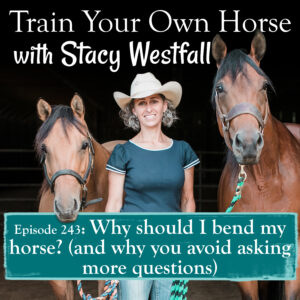Episode 243: Why should I bend my horse? (and why you avoid asking more questions)
July 12, 2023/

In this podcast, I discuss two ideas, the challenge of asking questions, and ‘why bend?’
The theme of this season of the podcast is, “No question is too small.” Today, I explain:
- why riders don’t ask more questions
- why the teacher might hesitate before answering
- what the moment of awkwardness could really be
Why bend?
- why you might skip bending
- why you might half-heartedly bend
- how bend increases safety and reduces bucking, rearing and bolting
- why bend improves balance
- advancing: the balance of bend and straightness
Do you have a seemingly simple question you’d like to ask?
Email me, you can even stay anonymous.
Ask your question because others will learn from it. Often times people don’t realize they have a question, until they hear it, and immediately identify with the question.
2 Comments
Leave a Comment
SUBSCRIBE TO THE PODCAST HERE:





YOURS FREE
WHY IS MY HORSE...?


Stacy, I have been using my hospital time to catch up on podcasts !! This podcast on bending it sooo good! I will definitely be needing to go back to basics when I get to a place I can ride again.
Your voice is so clear, concise, and pleasant!
And you have been so positive with me and my horses in the past! I just have to get past this blood thing and will be able to ride again!!
This podcast was a confidence booster for me and my granddaughter. We both hesitate and sorry we did most of the time. Great conversation between us! Thanks for sharing.